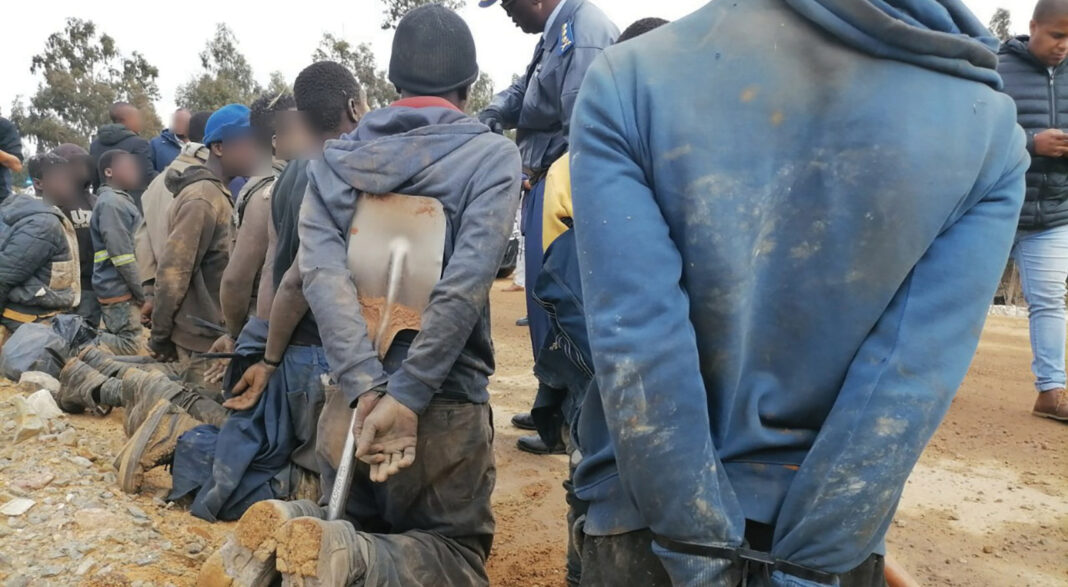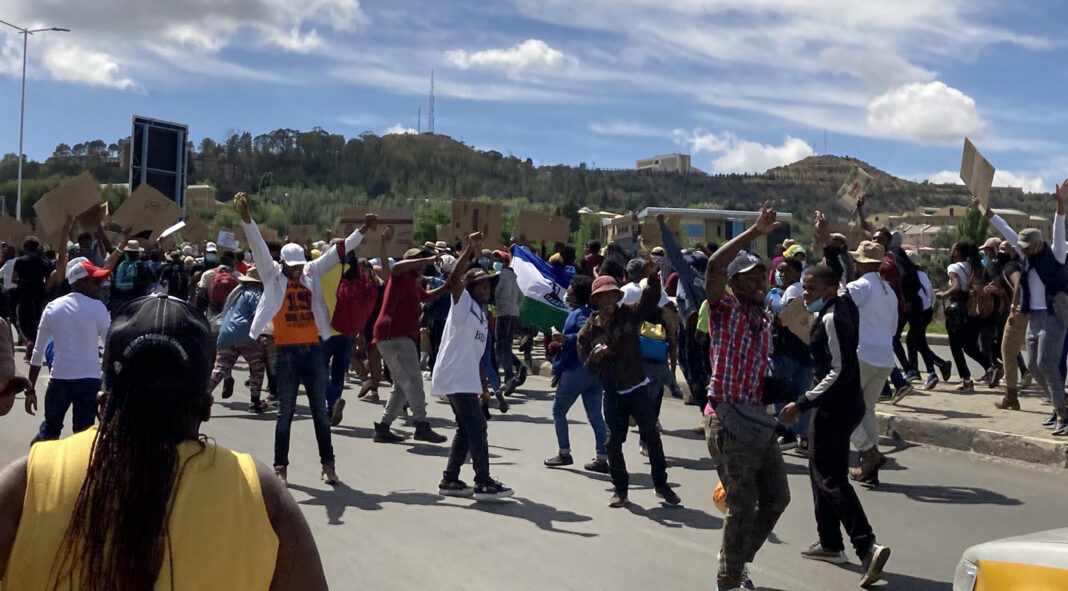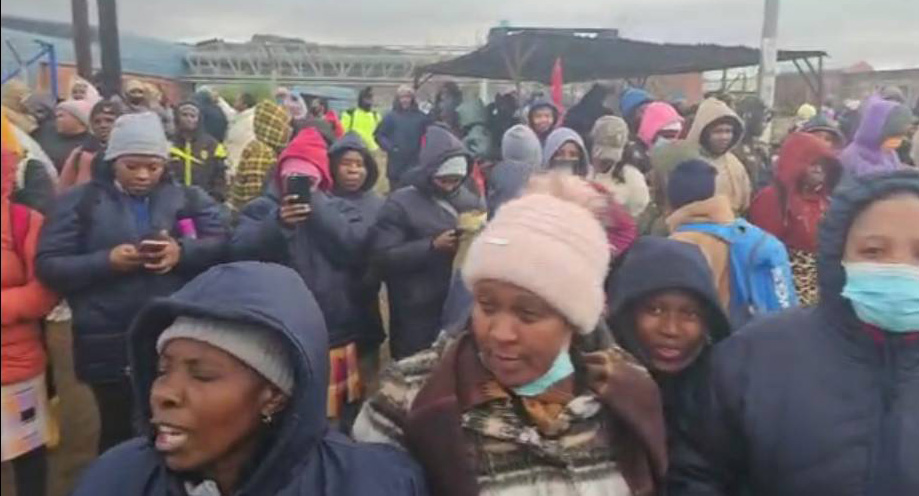A wave of gun violence has gripped Ha Toloane, a cluster of 19 villages in Matsieng, over 20 km south of the capital Maseru, leaving residents shaken and grieving.
Since the beginning of 2025, multiple fatal shootings have been reported, prompting increased deployment of police and military forces in the area.
Residents blame the violence on illegal miners, known as zama zamas, who clash at mining sites in South Africa and then bring their deadly feuds back home, endangering their communities and loved ones.
According to the Lesotho Mounted Police Service (LMPS), a recent shooting occurred on the night of June 1 at around 11 pm at the gate of a local business in Ha Toloane. Unknown assailants opened fire on a group of men without uttering a word before fleeing the scene.
When police arrived from Morija, they found a 29-year old man from Ha Toloane dead. Three others – two from Ha Toloane, aged 35 and 38, and a 40-year-old man from Tajane Ha Seqobela – were injured. Spent cartridges from 7.65mm firearms were recovered.
No arrests have been made, and investigations are ongoing.
Chief Tota Toloane condemned the violence, saying that while sporadic incidents occurred two to three years ago, the situation has worsened significantly in recent months.
“Brutal murders are on the rise. Victims include men, women, and even children,” the chief said.
He alleges that hitmen are being hired from South Africa, with some victims killed across the border and returned home in coffins.
“The police are aware. They often pick up wounded individuals,” Chief Toloane said.
He recounted the latest killing on June 1, as well as other incidents the previous week where two women were murdered separately in the same area.
In another case, a boy whose parents work in South Africa was shot.
“About seven people have been shot this year alone,” Chief Toloane lamented.
He also revealed his personal grief; he lost his brother to gun violence.
The chief urged the community to live peacefully and called on parents to stop sheltering their children when they are wanted for crimes.
Tiheli Pule, a member of the Ha Toloane Community Policing Forum, said the situation is overwhelming.
“No matter how hard we try, the violence continues. The involvement of firearms makes our efforts feel futile,” Pule said.
He also indicated that armed groups intimidate community policing volunteers, accusing them of being enemies.
In nearby Rothe, four illegal firearms, including an AK-47 rifle, were recently confiscated under the watch of Platoon Commander Lieutenant Tŝele Ntabejane.
Following the recent surge in violence, Lesotho Defence Force (LDF) officials visited Ha Toloane to promote peace and unity. Brigadier Khomo Mohobo, the LDF Chief of Operations, addressed the community, saying the King was deeply concerned about the escalating violence.
“Let us remember the teachings of the founder of the Basotho nation. Patriotism begins at home. Parents must raise their children with love, respect, and a fear of God. No one should justify crime with hunger or unemployment. In a community like Ha Toloane, people share even the smallest portion of food,” he noted.
Lt. Ntabejane decried the community’s apparent tolerance of criminal behaviour.
“These crimes are committed by your relatives, people you know. You deny it, but the truth is, you protect them. You stay silent until someone is killed. Peace will only prevail when the source of these guns is cut off,” he pointed out.
Identifying the source of illegal firearms remains a major challenge. Firearms, including military-grade weapons, are increasingly found in the hands of ordinary people.
Last year, Police Commissioner Advocate Borotho Matsoso told theReporter that the flow of illegal firearms into Lesotho is nearly impossible to control.
“Stopping gun smuggling is like trying to stop a flood with a bucket,” he said.
He stated that weapons purchased in South Africa for as little as R1,000 are smuggled across porous borders.
The legacy of armed liberation struggles in South Africa, Mozambique, and Zimbabwe has also contributed to the proliferation of weapons now in the hands of criminals.
“These guns are fuelling the bloodshed, claiming the lives of innocent people,” he said.
Despite a government ban on famo groups, violence continues to surge. The gangs often strike and vanish, using illegal crossings to evade capture, frustrating police efforts.
As the body count rises, communities like Ha Toloane remain trapped in fear, mourning the loss of their loved ones and calling for decisive action to stem the tide of violence.
International Humanitarian Law expressly forbids the use of weapons that are indiscriminate in nature.
It also dictates that civilians generally are protected from direct attack unless, and for as long as, they directly participate in hostilities. Civilians who are not part of armed forces or other organised groups and who are not directly involved in combat are considered protected. However, when civilians pick up arms and directly participate in hostilities, they lose their protection and can be targeted.
Former Prime Minister Moeketsi Majoro, in 2022, said famo gangsters had been classified by the government as ‘internal terrorists’.
In a similar vein, current Prime Minister Ntsokoane Matekane in 2024 described the same gangs as terrorists, and went on to direct the army commander, Lieutenant General Mojalefa Letsoela to end the wave of killings that have plagued Lesotho by any means necessary.








